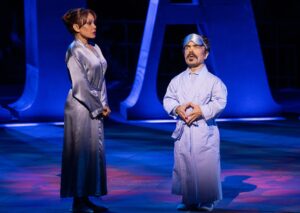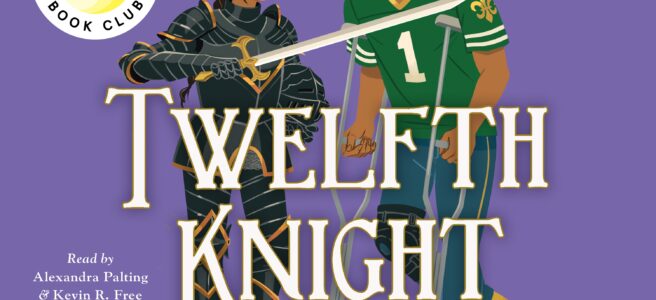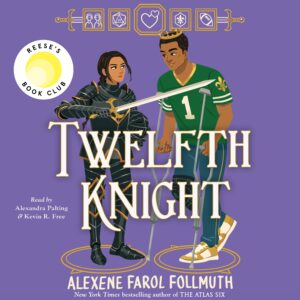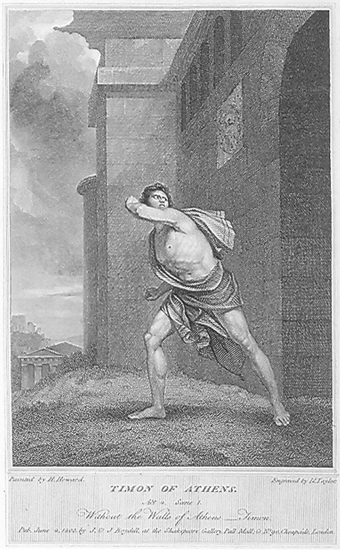Every year it’s the same, for those of us not living in New York. The play and cast are set for Public Theatre’s summer Shakespeare In The Park performances, and we gasp at the star power, knowing that we’ll never get to see it. Even if you’re in walking distance, apparently you’ve still got to wait in line for hours for “first come first served” tickets.
Not so fast! This year it was recorded, and now showing on PBS Great Performances! Sadly, it’s leaving on Dec 31, 2025, so you’ll have to be fast! Luckily I got to catch it.

This year we got Twelfth Night, starring: Peter Dinklage (Malvolio), Sandra Oh (Olivia, Jesse Tyler Ferguson (Andrew Aguecheek), Khris Davis (Orsino), and, in an inspired bit of casting, Lupita Nyong’o and her real-life brother Junior Nyong’o as Viola and Sebastian,
Thoughts

It took me a little while to realize, in the opening scene, that Viola keeps dropping in to Swahili. This had to be confusing for the audience who’d already be struggling to hear the words, only to have them randomly becoming incomprehensible. It’s not a new idea, plenty of tv shows have characters switching back and forth between English and Spanish, or other appropriate language for the context. I get it? As someone who only speaks English I don’t like it, for obvious reasons – but I understand that someone who is bilingual, maybe somebody for whom English is not their native or primary langauge, might actually appreciate this. I still stand by my argument though that it makes Shakespeare just that much harder to understand.
I really liked the way Orsino dealt with “the boys”, his entourage of followers who laugh at his jokes, agree with his pronouncements, and drop to do pushups when he’s displeased. I don’t usually think of Orsino with a posse, but it works here and nicely offsets Olivia’s crew who do this fun little switcheroo number when Cesario first shows up to deliver his message, all “masked” in sunglasses and taking their turn as the lady of the house. Lots of movement on stage, lots of laughs for the audience.
If I had to pick the “big name” from this year’s cast it would be Peter Dinklage. I hate to say things like “he’s easily recognizable in everything he does” but I think that Game of Thrones had a lot to do with that. So when I heard he’d be playing Malvolio, that’s what I looked forward to.

And I have to say, I didn’t love his portrayal. They’ve got him doing the weird “I don’t move my arms when I walk” thing that seems to accentuate his short stature, like they’re playing up some “little people walk funny” clichè. He’s got a silly haircut and he’s doing a silly voice, too. So yes, every time he’s on stage, there’s a good audience reaction for everything he does. But is that acting? He gets the laugh just by showing up, or changing how he stands, without ever saying anything.
Here’s the thing about casting Junior to play Viola’s brother – he’s actually Viola’s brother. That’s an opportunity I’m sure many directors would kill for. They look alike. Viola, as Cesario, spends most of the play dressed up in a man’s suit, which only adds to the charade. Shakespeare did love to play with twins, but I’m sure we’ve all been to many productions over the years where little more than a hat or scarf is all we get to say “Oh, ok, these two are supposed to be indistinguishable” and then go with it. For once, this time, we actually believe that they could easily be confused for one another. Except for the height – Junior’s significantly taller :). But you can’t have everything!
And then … and I love this … Junior speaks Swahili. Now the opening scene makes sense! Of course opening that way was confusing, here she is a little stranger in a strange land, speaking a language only she knows. She’s lost and confused; she has no one. That sets up Viola’s story beautifully.I don’t remember if she slips into Swahili randomly at other times in the play, but it would be great if she did. English is part of her cover story and it’s hard to keep up with it all the time. So, the reunion when her brother arrives, and they can both return to speaking their mother tongue? That’s great stuff, and I’m glad I saw it through to the end.
See It Before It Leaves
It’s Shakespeare, it’s free, it’s got celebrities you know. How can you not see it? Catch it before December 31, 2025! I hope they make this the new standard and we get to see the show this way every year.






